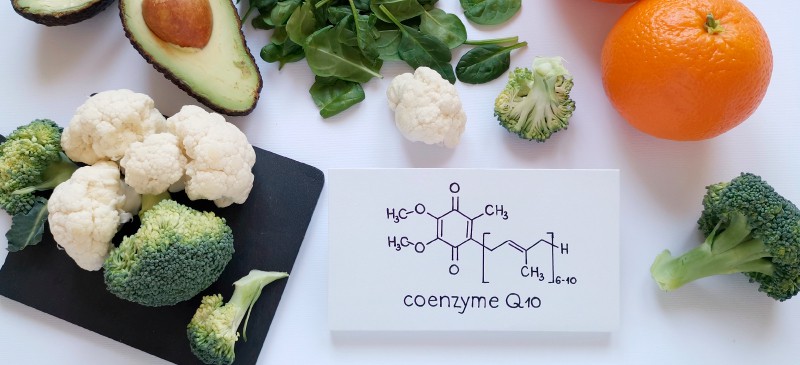
Coenzyme Q10 (COQ10) is an essential element for many daily functions. In fact, it’s required by every single cell in the body.
As an antioxidant that protects cells from the effects of aging, CoQ10 has been used in medical practices for decades, especially for treating heart problems.
Although we create some of our own coenzyme Q10, there are still advantages to consuming more, and lack of CoQ10 is associated with damaging effects of oxidative stress. CoQ10 deficiency is thought to be linked with conditions such as diabetes, cancer, fibromyalgia, heart disease and cognitive decline.
Is CoQ10 right for you? Let’s find out.
What Is CoQ10?
The name may not sound very natural, but coenzyme Q10 is in fact an essential nutrient that works like an antioxidant in the body. In its active form, it’s called ubiquinone or ubiquinol.
Coenzyme Q10 is present in the human body in the highest levels in the heart, liver, kidneys and pancreas. It’s stored in the mitochondria of your cells, often called the cells’ “powerhouse,” which is why it’s involved in energy production.
What is CoQ10 good for? It’s used for important functions such as supplying cells with energy, transporting electrons and regulating blood pressure levels.
As a “coenzyme,” CoQ10 also helps other enzymes work properly. The reason it’s not considered a “vitamin” is because all animals, including humans, can make small amounts of coenzymes on their own, even without the help of food.
While humans make some CoQ10, CoQ10 supplements are also available in various forms — including capsules, tablets and by IV.
How CoQ10 Works:
- To sustain enough energy to perform bodily functions, inside our cells tiny organelles called mitochondria take fat and other nutrients and turn them into useable sources of energy. This conversion process requires the presence of CoQ10.
- Coenzyme Q10 is not only necessary for producing cellular energy, but also for defending cells from damage caused by harmful free radicals.
- Coenzyme Q10 can exist in three different oxidation states, and the ability in some forms to accept and donate electrons is a critical feature in its biochemical functions that cancel out free radical damage.
- As a powerful antioxidant, Coenzyme Q10 can increase absorption of other essential nutrients. It’s been shown that it helps recycle vitamin C and vitamin E, further maximizing their effects.
Should I Take a CoQ10 Supplement?
Who needs to take CoQ10? CoQ10 production naturally declines as we age past about 40 years old— just when we need our cells to help defend us most. This means older adults and those looking to age gracefully may wish to supplement with it.
Research suggests that natural synthesis of CoQ10, plus dietary intake, appears to provide sufficient amounts to help prevent a CoQ10 deficiency in healthy people — however we produce less CoQ10 in older age, and people with certain health conditions, such as heart disease, also seem to make less.
CoQ10 Deficiency:
Some contributing factors to CoQ10 deficiency/low levels, besides aging and genetic defects, are believed to include:
- Having chronic diseases, such as diabetes, cancer and congestive heart failure
- High levels of oxidative stress
- Nutritional deficiencies in B vitamins
- Mitochondrial diseases
- Taking statin drugs
Rarely, a person may suffer from “primary coenzyme Q10 deficiency,” which is a genetic defect that stops the body from properly synthesizing this compound. For these individuals, supplementing with CoQ10 is typically needed to help reverse brain- and muscle-related symptoms.
COQ10 Benefits
1. Sustains Natural Energy
CoQ10 plays a role in “mitochondrial ATP synthesis,” which is the conversion of raw energy from foods (carbohydrates and fats) into the form of energy that our cells use, called adenosine triphosphate (ATP).
This conversion process requires the presence of coenzyme Q in the inner mitochondrial membrane. One of its roles is to accept electrons during fatty acid and glucose metabolism and then transfer them to electron acceptors.
The process of making ATP is crucial to every cell in the human body and also allows messages to be sent between cells. To maintain energy (down to the cellular level), ATP synthesis is vital, and it needs CoQ10 to do its job.
CoQ10 may even reduce fatigue related to exercise. Three separate double-blind, placebo-controlled studies in humans have shown improvements in exercise-related fatigue when supplemented with CoQ10 (at dosages between 100–300 milligrams per day).
2. Reduces Free Radical Damage
As both a water- and fat-soluble antioxidant, CoQ10 has been found to inhibit lipid peroxidation, which occurs when cell membranes and low-density lipoproteins are exposed to oxidizing conditions that enter from outside the body.
In fact, when LDL is oxidized, CoQ10 is one of the first antioxidants used to help offset the effects. Within mitochondria, coenzyme Q10 has been found to protect membrane proteins and DNA from the oxidative damage that accompanies lipid peroxidation and neutralize free radicals directly that contribute to nearly all age-related diseases (heart disease, cancer, diabetes, neurological disease, etc.).
One way this might be especially effective is found in a research study that discovered CoQ10 may help protect from some oxidative stress caused by insulin resistance and related to diabetes. Results are mixed on its effects on blood sugar, however.
3. Can Improve Heart Health and Offset Effects of Statin Drugs
Although experts feel that additional well-controlled clinical trials are still needed to prove its effects, CoQ10 has strong potential for prevention and treatment of heart ailments. It does this due its ability to improve cellular bioenergetics, acting as an antioxidant and boosting free radical-scavenging abilities.
What we do know is that CoQ10 supplementation may be useful for those taking statins and for people with high cholesterol. That’s because of its cholesterol-lowering effects.
Coenzyme Q10 may help reduce low-density lipoprotein (LDL) cholesterol and total cholesterol levels in some populations, including people with diabetes.
It may also lower side effects that statin medications can often cause, including fatigue. Statins are used to reduce an enzyme in the liver that not only decreases the production of cholesterol, but also further lowers the natural production of CoQ10.
It’s possible that CoQ10 can interact with lipid-lowering medications that inhibit the activity of HMG-CoA reductase, a critical enzyme in both cholesterol and coenzyme Q10 biosynthesis. A supplement of CoQ10 is often recommended to restore natural levels to their optimum marks and counter the effects of statin drugs, including muscle pain.
However, some evidence conflicts — as some reviews have found evidence is lacking to officially recommend CoQ10 supplementation for patients with statins.
This isn’t the only way CoQ10 can support the heart and circulatory system, though.
Does CoQ10 improve circulation? Yes — and it may be able to increase blood flow and improve exercise performance and capacity for people who have suffered heart failure.
Does CoQ10 lower blood pressure? Study results have been mixed overall.
According to the National Institutes of Health, “The small amount of evidence currently available suggests that CoQ10 probably doesn’t have a meaningful effect on blood pressure.”
However, a 2002 review published in the Journal of Cardiovascular Nursing states:
[CoQ10] has potential for use in prevention and treatment of cardiovascular disease, particularly hypertension (high blood pressure), hyperlipidemia, coronary artery disease, and heart failure… Further clinical trials are warranted, but because of its low toxicity it may be appropriate to recommend coenzyme Q10 to select patients as an adjunct to conventional treatment.
4. Slows Down Effects of Aging (Including Skin Changes)
Mitochondrial ATP synthesis is an important function for maintaining a fast metabolism, strength of muscles, strong bones, youthful skin and healthy tissue, and abnormal mitochondrial can cause issues.
READ RELATED: Happy wife, longer life! Being married linked to 20% lower risk of an early death, major study finds
Although supplementing with CoQ10 has not been shown to increase the life span of animals that have been tested with it, researchers believe it can slow down the age-related increase in DNA damage that naturally affects us all. Possible anti-aging benefits of consuming more CoQ10 include:
- Protection of the heart against stress-related aging.
- Protection of skeletal muscle genetic structure to keep those muscles strong, minimizing bone and joint injury risk.
- Improved fertility during your 40s by the reversal of egg degradation and increased production of ATP.
- Increased activity of antioxidants catalase and glutathione to protect cell membranes throughout the body from free radical damage.
- Reduced UV skin damage and signs of skin aging, such as wrinkles and loss of elasticity (when applied as topical cream and/or taken as a supplement). One randomized, placebo-controlled, double-blind study found that 150 mg/day of CoQ10 limited deterioration of viscoelasticity, improved smoothness and reduced some visible signs of aging when taken for 12 weeks.

5. May Help Protect Against Cancer
Within cells, CoQ10 helps transport proteins across membranes and separate certain digestive enzymes from the rest of the cell, which helps maintain optimal pH. It’s believed that diseases develop more easily in environments that have to work harder to maintain proper pH levels.
This, in addition to its major antioxidant capacity, may be one reason that cancer risk may be reduced among people with higher CoQ10 levels. Here are other reasons:
- Increasing impact of chemotherapy drugs and protect from side effects: Supplementing with CoQ10 during cancer treatment may help increase the cancer-killing potential of these medications (like doxorubicin and daunorubicin). There is also evidence that CoQ10 can protect the heart from DNA damage that can sometimes occur from high doses of chemotherapy medications.
- May slow or reverse spread of breast cancer: A 2017 article published in Future Oncology states: “Medical approaches are available for treatment of BC… A promising candidate is coenzyme Q10 which is an antioxidant that can target the mechanisms of BC tumor progression.” That’s not all. A 1994 study followed 32 breast cancer patients (ranging from 32–81 years old) classified as “high-risk,” due to the way their cancer had spread to lymph nodes. Each patient was given nutritional antioxidants, essential fatty acids and 90 milligrams per day of CoQ10. Not only did no patients die over the study period of 18 months, but no patient worsened during this period, all reported quality of life improvements and six patients went into partial remission. Two of the patients in partial remission were then given more coenzyme Q10 (300 milligrams each day), both of whom went into totally remission, showing complete absences of previous tumors and tumor tissue (one after two months, the other after three months).
- Could help prevent colon cancer: One research study discovered CoQ10 significantly lowered oxidative stress in the colon that leads to colon cancer.
- Might play a role in the prevention of cervical cancer: Low levels of CoQ10 are seen in patients with cervical cancer, although it’s not clear why.
- May improve survival rate in end-stage cancers: A pilot study over nine years followed 41 patients with various primary cancers that had advanced to stage four and were given CoQ10 supplements plus an additional antioxidant mixture. Of the patients followed, the median time of survival was 17 months, five months longer than expected overall. In total, 76 percent of the patients survived longer than expected on average, with little to no side effects noted from the treatment.
6. May Protect Cognitive Health
In those with cognitive impairments, such as Parkinson’s disease, increased oxidative stress in a part of the brain called the substantia nigra is thought to contribute to symptoms.
CoQ10 has been shown to offset decreases in activity of mitochondrial electron transport chains that affect nerve channels and brain function, and studies show that people with cognitive disorders tend to have reduced levels of CoQ10 in their blood.
One randomized, placebo-controlled trial that evaluated the efficacy of 300, 600 or 1,200 milligrams a day given to 80 people with early Parkinson’s disease found that supplementation was well-tolerated and associated with slower deterioration of cognitive functions compared to the placebo. That being said, not every study has found coenzyme Q10 to be effective over placebo.
Some preliminary studies have found positive outcomes in lab and research studies, and a few small human clinical trials, for CoQ10 to treat cognitive decline seen in other neurological diseases, including progressive supranuclear palsy, Huntington’s disease, amytrophic lateral sclerosis and Friedreich’s ataxia.
Regarding the most well-known neurodegenerative disease, Alzheimer’s disease, there have been little to no human trials conducted using CoQ10. However, research studies have found modestly positive results, making coenzyme Q10 a possible addition to an Alzheimer’s diet and supplementation plan.
7. Could Improve Male Infertility
It’s possible CoQ10 can help improve fertility issues in men. In clinical trials, supplementation with coenzyme Q10 significantly:
8. Helps Treat Symptoms of Fibromyalgia
Multiple clinical trials and case reports have found that CoQ10 may be a powerful natural method of treating fibromyalgia symptoms. In adults, the dosage was typically 300 milligrams per day, while one study on juvenile fibromyalgia focused on a 100 milligram dose.
Improvements included:
COQ10 Foods
Coenzyme Q10 is found naturally in our diets from foods, including fish, liver, kidney and the germs of whole grain.
The richest natural sources of dietary coenzyme Q10 are meat, poultry and fish, but vegetarian options, such as beans, nuts, some vegetables, eggs and dairy products, are also helpful for increasing your intake.
Some of the best foods for supplying CoQ10 include:
Currently, there is no specific dietary intake recommendation for CoQ10 established from the Institute of Medicine or other agencies.
Because it’s a fat-soluble antioxidant, it’s most easily absorbed when consumed with a small amount of healthy fats (just like vitamins E and A).
Although it can be obtained from certain foods, foods tend to only supply low doses, which is exactly why many experts recommend supplementing if you’re older or have a condition that may benefit from CoQ10 supplementation.
Symptoms of deficiency have not been widely reported or studied in much detail in the general population. It’s estimated that the average person’s diet contributes around 25 percent of total CoQ10.
The best way to obtain enough is to eat a varied, nutrient-dense diet – plus to consider supplementing if it makes sense for your individual situation.
Related: Are Organ Meats and Offal Healthy to Eat?
COQ10 Supplements and Dosage
COQ10 is found in such low quantities in most foods that even a healthy diet might be an impractical way to meet the daily recommended dosages. Taking a daily, high-quality CoQ10 supplement in capsule form (which helps with easier absorption into the bloodstream) can close the bridge between this gap.
CoQ10 Supplement Dosage:
Dosage sizes of CoQ10 dietary supplements range anywhere from 50–1,200 milligrams per day. Most supplements fall in the 100–200 milligram range.
Depending on the condition a person is attempting to treat, the CoQ10 dosage recommendations can range from 90 milligrams up to 1,200 milligrams. This larger dose has typically been used only to study the neurological benefits of CoQ10 — most successful studies use between 100–300 milligrams.
How much do CoQ10 dietary supplements typically cost, and how can you find a trustworthy brand?
The cost of taking 100 milligrams of a coenzyme Q10 ranges from 8 cents to over $3, depending on the specific brand and strength.
What’s important, and makes a big difference in terms of the benefits you’ll get from taking CoQ10 supplements, is that the concentration is actually equal to the amount listed. Some products use fillers or enhancers and may even supply less of a dosage than the manufacturer claims.
Look for products with reviews, certifications ensuring the listed dosage is correct and as minimal preservatives or fillers as possible, along with supplements that possess the right CoQ10 concentrations.
When should you take CoQ10, morning or night?
While it can be taken any time that is most convenient, it’s best to take CoQ10 with a meal containing fat, since it’s fat-soluble. If you take a CoQ10 dosage that exceeds 100 mg per day, it’s best to split doses into two or three smaller servings, which will help with absorption.
There’s some evidence that taking CoQ10 at night may help with the body’s ability to use it, so a good option is taking it with dinner. However, some people report having difficulty falling asleep if they take CoQ10 close to bedtime, so this comes down to individual preference.
Risks and Side Effects
What are the risks of taking CoQ10? Although it’s considered to be very safe overall and has been used in the medical field for many years, CoQ10 side effects may still affect some people.
Potential CoQ10 side effects can include:
- Diarrhea
- Nausea
- Heartburn
- Upper abdominal pain
- Loss of appetite
- Headaches
- Insomnia
- Rashes
- Fatigue
- Dizziness
- Light sensitivity
- Irritability
Always read the dosage labels on your coenzyme Q10 supplements, and stick to them unless instructed otherwise by your health care professional.
Who should not take CoQ10? If you’re pregnant or breast-feeding, it’s probably best not to take CoQ10 supplements, since it’s not clear whether or not they’re safe in these cases.
Coenzyme Q10 supplements can decrease the anticoagulant efficacy of statins like warfarin and other common cholesterol-lowering medications (such as those known as HMG-CoA reductase inhibitor statins). Talk to your doctor about being monitored if you take these medications.
Conclusion
- CoQ10 is a natural substance found in the body and certain foods that helps fight oxidative stress and prevent tissue damage.
- What is CoQ10 good for? The top benefits of CoQ10 include having cholesterol-lowering effects, sustaining natural energy, improving heart and brain health, slowing signs of skin aging, and fighting some forms of cancer.
- Coenzyme Q10 is produced by the body naturally and also found in small amounts in some foods. CoQ10 foods include meat, fish, nuts, seeds, veggies and eggs. However, our ability to produce and use it decreases significantly with age.
- CoQ10 dietary supplement dosages range between 30—1,200 milligrams/daily, and the typically recommended dosage is between 100–200 milligrams each day for most conditions.
- CoQ10 side effects can potentially include digestive issues, fatigue, mood swings and fatigue, among others.
Source:








